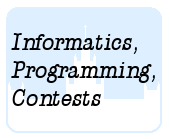Подразделы
Другие разделы
| 2110. FONT |
| 2111. Blocks |
| 2112. Circles |
| 2113. Hash |
Дата и время
04/02/2026 19:23:38
 2109. Pattern
2109. Pattern
 Pattern
Pattern
 Техника программирования, моделирование
Техника программирования, моделированиеОлимпиадные задачи на английском языке

| 15/07/2014 | Лето 2014 - 11 (A) |
Ограничения: время – 1s/2s, память – 64MiB Ввод: input.txt или стандартный ввод Вывод: output.txt или стандартный вывод 
Послать решение Blockly Посылки Темы Где Обсудить (0)
In his spare time, Vjeko likes to browse through files in directories. Unfortunately, it seems to him that
the console on his computer broke down and now it doesn't correctly print file names that match a
certain pattern.
A pattern is string consisting of lowercase letters of the English alphabet and exactly one asterisk.
A file name matches a pattern if the pattern string can be made equal to the file name by replacing the
asterisk with an arbitrary string of lowercase letters of the English alphabet (an empty string
substitution is also possible). For example, strings “abcd”, “ad” and “anestonestod” all match the
pattern “a*d” and the string “bcd” does not.
Write a programme that will, given a pattern and file names, output whether a file name matches the
pattern or not.
The first line of input contains the integer `N` (`1\ ≤\ N\ ≤\ 100`), the number of files.
The second line of input contains a string of characters consisting of only lowercase letter of the
English alphabet and exactly one asterisk (ASCII value 42). The length of the string will not exceed 100
and the asterisk will not be located at the beginning nor at the end of the string.
Each of the following N lines contains file names, each in its own line. The file names consist of only
lowercase letters of the English alphabet and their length will not exceed 100.
Output `N` lines. The `i`th line should be “DA” (Croatian for yes) if the `i`th file name matches the pattern
or “NE” (Croatian for no) if the i th file name does not match the pattern.
Sample Input #1
3 a*d abcd anestonestod facebook
Sample Output #1
DA DA NE
Sample Input #2
6 h*n huhovdjestvarnomozedocisvastan honijezakon atila je bio hun
Sample Output #2
DA DA NE NE NE DA

 Начало
Начало